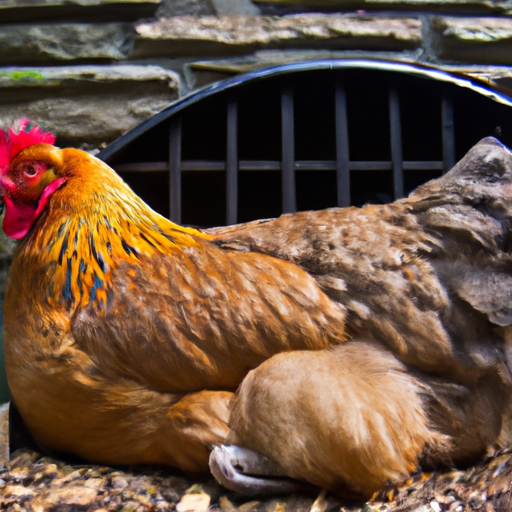Are there certain chicken breeds that are more sensitive to noise than others? Noise sensitivity in chickens can vary across different breeds, with some being more prone to being startled or disturbed by loud sounds. This article explores whether there are specific chicken breeds that are particularly noise-sensitive and provides insights into how noise sensitivity can impact the behavior and well-being of chickens. By understanding these characteristics, chicken owners can better cater to the needs of their flock and create a peaceful and stress-free environment for their feathered friends.
Understanding Noise Sensitivity
What is noise sensitivity?
Noise sensitivity refers to a chicken’s heightened reaction to loud or sudden noises. Just like humans, chickens can experience varying levels of sensitivity to noise, with some being more susceptible to stress and anxiety when exposed to loud sounds. This can range from trucks passing by to thunderstorms or even everyday household noises. Excessive noise can significantly impact a chicken’s overall health and well-being, potentially leading to a decrease in productivity and quality of life.
Factors contributing to noise sensitivity in chickens
Several factors contribute to the level of noise sensitivity in chickens. Genetics play a significant role, as some chicken breeds are naturally more prone to being sensitive to noise. Additionally, the individual chicken’s personality and past experiences may influence their noise sensitivity. Chickens that have been exposed to traumatic or loud noises in their past may exhibit heightened sensitivity as a result. It’s important to consider these factors when addressing and managing noise sensitivity in chicken breeds.
Chicken Breeds and Noise Sensitivity
Are all chicken breeds equally noise-sensitive?
No, not all chicken breeds are equally noise-sensitive. Each breed has its own characteristics, including noise tolerance. While some breeds may be more laid-back and less reactive to loud sounds, others can be highly sensitive and easily stressed by noise. For example, chickens with large combs and wattles, such as the Silkie or Polish breed, tend to be more sensitive to noise. Understanding the noise sensitivity tendencies of different breeds can be helpful for selecting the right breed for your specific environment.
Identifying noise-sensitive chicken breeds
Identifying noise-sensitive chicken breeds can be done by observing their behavior and reactions in various situations. Common signs of noise sensitivity in chickens include excessive squawking, increased alertness, restlessness, and an overall nervous disposition when exposed to loud or sudden noises. Some breeds known to exhibit a higher level of noise sensitivity include the Silkie, Polish, Hamburg, and Sultan breeds. If noise sensitivity is a concern for you, it’s crucial to research and select breeds that are known for their calm and relaxed nature.
Managing Noise Sensitivity in Chicken Breeds
Creating a calm environment
Creating a calm environment is essential for managing noise sensitivity in chickens. This can be achieved by minimizing loud or sudden noises in the chicken’s surroundings. Avoid placing chicken coops near busy roads or areas where the noise level is consistently high. Consider using natural barriers, such as trees or shrubs, to block out noise or installing soundproofing materials within the coop. Providing a peaceful and serene environment can greatly reduce the stress and anxiety levels in noise-sensitive chicken breeds.
Training and socializing chickens
Training and socializing chickens from a young age can help them become more accustomed to different sounds and reduce their noise sensitivity. By introducing chickens to various noises gradually, such as clapping or playing recorded sounds, they can become desensitized and less reactive. Additionally, allowing chickens to interact with each other and other animals in a controlled and safe environment can help them develop a more confident and relaxed temperament, making them less susceptible to noise-induced stress.
Utilizing noise-reducing measures
Implementing noise-reducing measures can significantly alleviate noise sensitivity in chicken breeds. One effective method is to provide chickens with a secure and enclosed roosting area where they can seek refuge during times of increased noise. Installing acoustic panels or sound-absorbing materials within the coop can also help dampen external noises. Additionally, consider using white noise machines or calming music to create a soothing ambiance within the chicken’s environment. These measures can be particularly beneficial during thunderstorms or other events that may trigger noise-sensitive reactions.
Potential Risks of Noise Sensitivity in Chickens
Impact on overall health and well-being
Noise sensitivity in chickens can have a significant impact on their overall health and well-being. Continuous exposure to loud or sudden noises can elevate a chicken’s stress levels, leading to various health issues such as decreased immune function, poor digestion, and increased susceptibility to diseases. Prolonged stress can also negatively affect a chicken’s mental health, diminishing their quality of life and overall happiness. It is crucial to address noise sensitivity in chickens to ensure their long-term health and well-being.
Possible consequences on egg production and brooding
In addition to affecting a chicken’s overall health, noise sensitivity can also impact their egg production and brooding behaviors. Noise-sensitive chickens may experience disruptions in their egg-laying patterns and may produce fewer eggs as a result. The stress caused by excessive noise can also interfere with their ability to brood and care for their eggs, potentially leading to hatchling mortality. Managing noise sensitivity in chicken breeds is essential for maintaining a healthy and productive flock.
Conclusion
Understanding and addressing noise sensitivity in chickens is vital for ensuring their health, well-being, and productivity. By recognizing the factors contributing to noise sensitivity, identifying noise-sensitive breeds, and implementing strategies to manage and reduce noise-related stress, chicken owners can create a calm and peaceful environment for their feathered friends. Through a combination of creating a serene atmosphere, training and socializing chickens, and utilizing noise-reducing measures, noise sensitivity can be effectively managed and minimized, ensuring happier, healthier, and more productive chickens overall.




